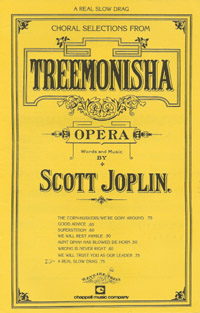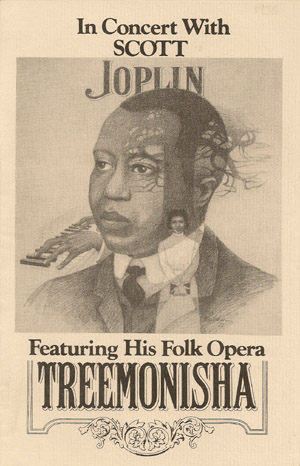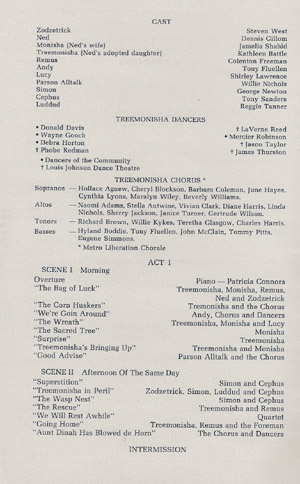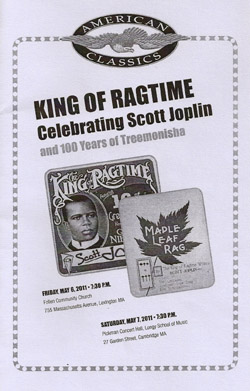
A Centennial Tribute
to
Scott Joplin's Opera,
TREEMONISHA
(published in 1911)
When TREEMONISHA, libretto and music by Scott Joplin (1868-1917), was re-discovered by Vera Brodsky Lawrence and published in 1971, musicians everywhere began to take notice of its value as an opera with both innocence and vitality. William Bender, writing in TIME magazine in 1975, called it "one of the great curios in all American opera."
Joplin's first opera, A GUEST OF HONOR, has been lost and hopefully will be found someday.
It would be a mistake to call TREEMONISHA a "ragtime opera." There are only three chorus numbers that can be said to be ragtime pieces: "We're Going Around: A Ring Play," "Aunt Dinah Has Blowed De Horn", and "A Real Slow Drag." (the lively finale of the opera). However, these three infectious choruses are among the highlights of the opera and they are all terrific numbers.
First Complete Opera Recording
TREEMONISHA (Deutsche Grammophon Recording)
Composer Gunther Schuller was approached to make the opera suitable for today's audiences. He arranged and orchestrated Joplin's piano-vocal score of TREEMONISHA and it was performed and then recorded in 1975 by soloists and chorus from the Houston Grand Orchestra on a splendid 2 LP set on the prestigious Deutsche Grammophon.
Watch the finale ("A Real Slow Drag") and other excerpts from TREEMONISHA at YouTube.
This 2 LP set received a great deal of praise from critics. Eric Salzman in STEREO REVIEW magazine wrote at the end of his 1976 review:
It only took seventy [actually 65] years and a German record company to get this far from perfect black American opera onto records; now let's have the good sense to accept it and enjoy it for what it is.
In her excellent notes with the LP set, Vera Brodsky Lawrence, wrote the following:
Masquerading as a folk fable, TREEMONISHA nevertheless conveys a significant social message, astonishing for its period and still valid as a basic tenet of black liberation: that education is the road to salvation. Joplin, a man ahead of his time in more ways than one, also dipped into the area of women's liberation, allowing his eighteen-year-old heroine,because she has an education, to become the leader of her people.
What is sad to consider is that performance opportunities were very limited for black composers in 1911. Joplin spent his own money to publish a piano-vocal score of his opera. Reportedly, Joplin could only arrange one performance of the opera in Harlem in 1915 and it was a dismal failure. He died, a broken artist, two years later in a mental hospital after trying for many years to get his greatest work performed.Cleveland Opera Performance
In 1976, I was fortunate to attened a concert version of TREEMONISHA at Cuyahoga Community College in Cleveland, Ohio. The concert opened with several of Joplin's popular piano pieces -- "Maple Leaf Rag," "Pineapple Rag," and "Exercises from the School of Rag" among them.
They were performed by Clifford Jackson and Gertrude Wilson. Here is the cover of the concert program:
Following the piano rags, all three acts of TREEMONISHA were performed from the piano-vocal score by the large cast of singers and dancers. The soprano who played Treemonisha was not well known then but later became an opera superstar -- Kathleen Battle. This is the cast list from the program:
Cambridge Opera Performance
Now, to bring this opera up-to-date, my wife and I were very pleased to attend a recent performance of selections from TREEMONISHA and selected ragtime pieces, performed by members of American Classics at the Pickman Concert Hall, Longy School of Music in Cambridge, Massachusetts.
The featured singers were: Bradford Conner, James Dargan, Christina DeVaughn, Mary Ann Lanier, Anita Murrell (Treemonisha), Merle Perkins, Benjamin Sears, Fred Van Ness. Assisting them were these fine musicians: Jim Dalton, banjo and mandolin, Eli Newberger, tuba, Margaret Ulmer, piano. All of these musicians deserve high praise for their performances. I add a special thanks to Ms. Ulmer for writing the excellent program notes and giving perceptive comments about Joplin and his ragtime music.
The first half of the concert featured selected Joplin ragtime pieces, with the instrumenalists giving Joplin his due with a fine selection of his classics, including one of my favorites, "Solace - A Mexican Serenade," a beautiful rendition with Jim Dalton playing mandolin while accompanied by Margaret Ulmer. The tuba playing of Eli Newburger added just the right touch of support. The first half ended with the lilting "Pine Apple Rag," in the 1910 vocal version sung by Mary Ann Lanier and the entire cast.
After intermission, there were highlights from TREEMONISHA, with spoken introductions by Benjamin Sears. The highlights included solo numbers, such as "Good Advice" (convincingly sung by James Dargon with chorus) and "Wrong is Never Right" (sung by the fine strong voice of Fred Van Ness). There were also the three terrific ragtime choruses and one of them "Aunt Dinah Has Blown De Horn" was used as the rousing encore.
This was an evening of wonderful music paying tribute to probably America's first great crossover composer from the past.
I'd like to think that Scott Joplin himself would have been proud and pleased to hear such a great tribute to his music.
-- Roger Hall, 8 May 2011
For more information about their concerts, see
Reviews of their previous concerts paying centennial tributes to great songwriters:
"Pardon My Southern Accent: A Johnny Mercer Celebration"
"Luck Be A Lady" - Songs of Frank Loesser
Please help support
American Music Preservation.com
Use this handy Search Box for your purchases from Amazon.com
Home page: Classical Composers
© 2011 PineTree Productions. All Rights Reserved.





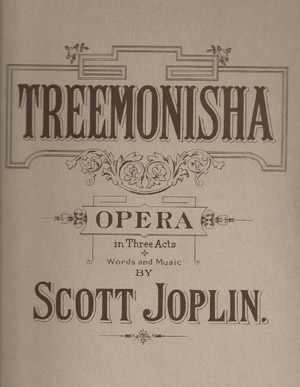
![Scott Joplin's Treemonisha [Original Cast Recording]](http://ecx.images-amazon.com/images/I/51WE2W0SCJL._SL500_AA300_.jpg)
